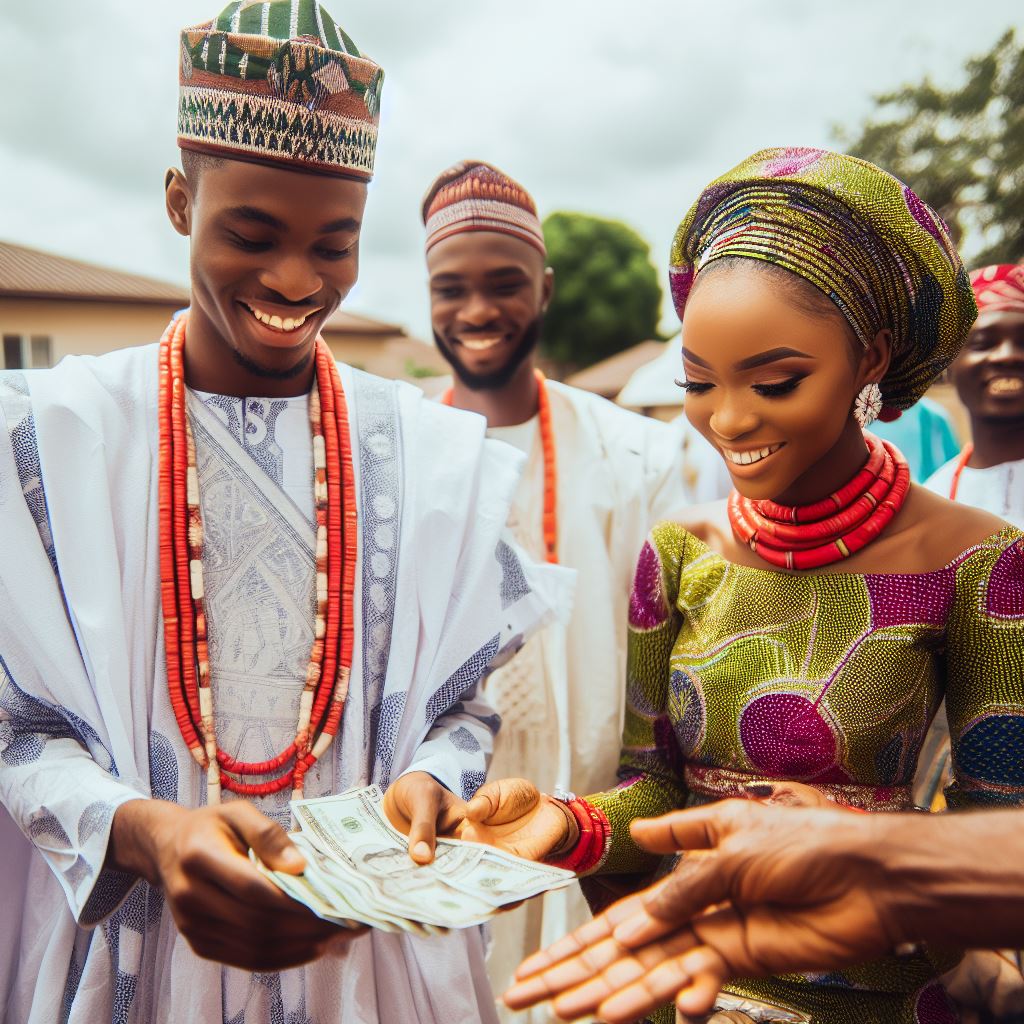The Cost Breakdown: Obtaining a Marriage Certificate in Nigeria
Last Updated on October 13, 2023
Introduction
Overview of the importance of a marriage certificate
In Nigeria, a marriage certificate is a vital document that legally validates a couple’s union and establishes their marital status.
It serves as proof of marriage and holds great importance in various aspects of life.
The significance of obtaining a marriage certificate in Nigeria
Firstly, a marriage certificate grants couples legal recognition and protection under the law. It provides security and certain rights that are only afforded to legally married couples.
These rights include inheritance rights, healthcare benefits, and property ownership.
Moreover, a marriage certificate is often required for official purposes, such as applying for visas or accessing social services.
It serves as evidence of a valid marriage and ensures smooth processing of paperwork in various government and non-governmental institutions.
Furthermore, obtaining a marriage certificate in Nigeria is essential for couples who wish to start a family.
It establishes the legitimacy of children born within the marriage and secures their rights to inheritance and other legal benefits.
In addition to its legal significance, a marriage certificate holds immense cultural value in Nigeria.
It symbolizes the commitment and union of two individuals in the eyes of their community, family, and friends. It is an essential element in traditional ceremonies and celebrations.
Getting a marriage certificate in Nigeria is not merely a procedural formality. It has far-reaching implications, granting legal recognition, protection, and cultural significance to couples.
Thus, it is crucial for couples to prioritize obtaining their marriage certificate to fully benefit from the rights and privileges it provides.
Background Information
Legal Requirements for Marriage in Nigeria
- Both parties must be at least 21 years old or have parental consent if below 21.
- They must not be within the prohibited degrees of relationship, as defined by the Marriage Act.
- Both parties must have valid identification documents, such as passports or birth certificates.
- A marriage notice must be given to the registry at least 21 days before the intended wedding date.
Role of the Federal Marriage Registry in Issuing Marriage Certificates
- The Federal Marriage Registry is responsible for overseeing and registering marriages in Nigeria.
- It is the official government body that issues marriage certificates to couples.
- The registry ensures adherence to legal requirements and maintains a record of all registered marriages.
- After their wedding ceremony, couples must visit the registry to apply for their marriage certificate.
Types of Marriages Recognized in Nigeria
- Customary Marriage: Customary marriage follows traditional customs
- Islamic Marriage: Islamic marriage adheres to Muslim rites.
- Civil Marriage: Civil Marriage is legally recognized
- Church Marriage: Church marriage is religious.
In Nigeria, couples must fulfill legal requirements and obtain a marriage certificate to marry. Let’s delve into the process.
Obtaining a marriage certificate in Nigeria involves fulfilling legal requirements and obtaining it from the Federal Marriage Registry.
Understanding the legal requirements, the role of the registry, and the different types of marriages recognized in Nigeria is essential for couples planning to tie the knot in the country.
Required Documents
In order to obtain a marriage certificate in Nigeria, there are several required documents that need to be submitted.
Proof of age and identity
The first document you will need to provide is proof of your age and identity. This can be in the form of a valid national identification card, international passport, or driver’s license.
Proof of marital status
Next, you will need to provide proof of your marital status. If you are single, you must provide a sworn affidavit affirming your unmarried status.
For divorce or widowhood, present relevant certificates.
Passport photographs
You will also need to submit passport photographs alongside your application. These photographs should be recent and meet the specific requirements set by the issuing authority.
Proof of payment
You can typically do this through a designated bank or an online payment portal, with fees varying by location. Ensure original document presentation and be ready for potential additional copies.
Check with your local marriage registry for area-specific requirements.
By ensuring that you have all the necessary documents, you can expedite the process of obtaining a marriage certificate in Nigeria.
Remember to double-check the requirements with the relevant authorities to avoid any unnecessary delays or complications.
Read: Nigeria’s Views on Love, Commitment, & Marriage Definition
Registration Process
Step-by-step guide to registering for a marriage certificate
- Visit the Federal Marriage Registry to start the registration process.
- Submit all the required documents to the registrar.
- Pay the necessary registration and processing fees.
- Attend the marriage declaration interview with your partner.
- Finally, receive your official marriage certificate.
Registering for a marriage certificate in Nigeria is a straightforward process that involves a few key steps. Here’s a step-by-step guide to help you navigate through the registration process:
1. Visit the Federal Marriage Registry
The first step is to visit the designated Federal Marriage Registry in your state. This is where you will initiate the registration process. Make sure to find out the specific registry for your location.
2. Submit the required documents
Once you’re at the registry, you’ll need to submit the necessary documents for the registration. These documents include:
- Completed marriage registration form (obtained from the registry)
- Original birth certificates of both partners
- Valid photo identification (e.g., passport, national identity card, driver’s license)
- Proof of residence (utility bills, rent receipts, etc.)
- Sworn affidavits of bachelorhood/spinsterhood
- Two recent passport-sized photographs of both partners
Make sure to provide all the required documents in their original form and any additional documents requested by the registry.
3. Pay the registration and processing fees
After submitting the documents, you will be required to pay the registration and processing fees.
The amount may vary depending on your location, so inquire about the exact fee at the registry. Ensure to obtain a receipt for your payment.
4. Attend the marriage declaration interview
As part of the registration process, you and your partner must attend a marriage declaration interview. This interview is conducted by a registrar who will verify your eligibility for marriage.
It is crucial to be honest and provide accurate information during this interview.
5. Receive the marriage certificate
Once your registration and interview are complete, you will receive your marriage certificate. This document serves as the legal proof of your marriage.
Ensure to keep multiple copies of the certificate for future use, like changing your marital status on official documents.
Remember, the registration process may vary slightly depending on the specific Federal Marriage Registry you visit.
It is always advisable to inquire about any additional requirements or steps specific to your location.
Following these steps will ensure a smooth and successful registration process for obtaining a marriage certificate in Nigeria.
Read: Marriage Parables: Jesus’ Teachings and Modern Interpretations
Cost Breakdown
Breakdown of the expenses involved in obtaining a marriage certificate
- Registration fee.
- Processing fee.
- Marriage declaration interview fee.
- Additional charges (optional services).
Obtaining a marriage certificate in Nigeria involves several expenses that need to be considered. In this section, we will break down the costs associated with this process.
1. Registration fee
The first expense you will encounter when obtaining a marriage certificate is the registration fee.
This fee covers the administrative costs of registering your marriage with the appropriate authorities. It is an essential step in the process and cannot be avoided.
2. Processing fee
After paying the registration fee, you will need to cover the processing fee. This fee is charged for the handling and processing of your marriage certificate application.
It is necessary to ensure that all the required documents are verified and processed correctly.
3. Marriage declaration interview fee
As part of the marriage certificate application process, couples are required to undergo a marriage declaration interview.
This interview is conducted to verify the authenticity of the marriage and ensure that both parties are willingly entering into the union. A fee is usually charged for this interview.
4. Additional charges (optional services)
In addition to the basic fees mentioned above, there may be additional charges for optional services. These services can include expedited processing, mailing services, or other special requests.
The cost of these services will vary depending on your specific needs.
It is important to note that the fees mentioned above are subject to change and may vary depending on the location and specific requirements of the marriage certificate process.
It is advisable to check with the relevant authorities for the most up-to-date information on costs.
Obtaining a marriage certificate in Nigeria involves several expenses, including registration and processing fees, a marriage declaration interview fee, and potential additional charges for optional services.
It is essential to budget for these costs when planning to obtain a marriage certificate.
Read: The Biblical Significance of the Marriage Bed Explored

Challenges and Considerations
Potential Challenges and Difficulties in the Process
- The complex bureaucratic procedures involved may cause delays and frustrations.
- Long wait times at government offices and lack of transparency can be frustrating.
- Documentation requirements might be confusing and difficult to fulfill for some couples.
- Unavailability of required documents can pose challenges, especially for couples with limited resources.
- Issues with incorrect or inconsistent information provided by government officials can cause confusion.
Common Issues Faced by Couples when Obtaining a Marriage Certificate in Nigeria
- Red tape and corruption are common challenges faced by couples in the process.
- Obtaining consent from parents or guardians may be a hurdle for some couples.
- Some religious and ethnic differences may cause objections from family members or communities.
- Inability to afford the necessary fees and expenses can be a major issue for many couples.|
- Unclear marriage laws and lack of awareness about legal rights can lead to complications.
Tips and Advice for Overcoming Obstacles
- Start the process early to allow time for any unexpected delays or complications.
- Research and seek guidance from individuals who have gone through the process before.
- Ensure all required documents are available and accurate to avoid delays or rejections.
- Keep copies of all submitted documents and communicate with government officials regularly.
- Consider hiring a lawyer who specializes in marriage registration to navigate the process efficiently.
Obtaining a marriage certificate in Nigeria may involve several challenges, including bureaucratic procedures, documentation requirements, financial constraints, and cultural objections.
However, with proper planning, research, and persistence, couples can overcome these obstacles and successfully obtain their marriage certificate.
It is essential to stay informed, seek assistance when needed, and ensure all necessary documents are in order to minimize difficulties in the process.
Read: The Role of Prayer in Keeping Marriages Strong in Nigeria
Benefits of Having a Marriage Certificate
Advantages and Importance of Having a Valid Marriage Certificate
- A marriage certificate serves as legal proof of marriage.
- It provides official recognition and validation of the marital union.
- Having a valid marriage certificate can help establish credibility and legitimacy.
- It is essential for various legal, financial, and social reasons.
- Government benefits and programs often require marriage certificates for eligibility.
- They serve as proof of marital status for insurance and financial accounts.
- A marriage certificate ensures protection for both spouses, especially in case of disputes or separation.
- Having a valid marriage certificate can provide peace of mind and security in relationships.
Legal Protections and Rights Conferred by a Marriage Certificate
- A marriage certificate grants certain rights and benefits to both partners.
- Spouses are legally recognized as next of kin and have entitlements in matters of inheritance.
- It provides legal protection for joint assets and properties owned by the couple.
- A marriage certificate enables spouses to make medical and legal decisions on behalf of each other.
- Partners can access spousal benefits such as health insurance, retirement plans, and pension schemes.
- Marriage certificates provide legal safeguards against domestic violence and marital abuses.
- In the event of a partner’s death, a marriage certificate helps determine inheritance and survivor benefits.
- Spouses are entitled to rights related to child custody, adoption, and visitation rights.
Usefulness for Official Purposes and Administrative Procedures
- A marriage certificate is a prerequisite for obtaining a spouse visa or immigration benefits.
- It is required when changing surnames or updating personal identification documents.
- Marriage certificates are necessary for opening joint bank accounts and obtaining loans together.
- Spouses need a marriage certificate to enroll their children in schools and apply for their passports.
- It serves as proof of identity to facilitate various administrative procedures.
- A marriage certificate is necessary for obtaining a divorce or annulment, if needed.
- It is essential for the dissolution of joint financial obligations and assets.
- Marriage certificates are useful for social and religious purposes, such as marriage ceremonies and traditions.
Having a valid marriage certificate brings numerous benefits and advantages to couples.
From legal protections and rights to administrative purposes, this document serves as tangible evidence of a union recognized by law and society.
It is crucial for obtaining various benefits, facilitating official procedures, and ensuring the security and well-being of both partners.
Therefore, obtaining a marriage certificate in Nigeria is not only essential but also highly beneficial for married couples.
Conclusion
To recap, we’ve meticulously dissected the costs and steps involved in obtaining a marriage certificate in Nigeria.
This seemingly ordinary document is, in fact, an invaluable key to legal recognition, rights, and protection for your marital union in Nigeria.
We urge our readers to place the process of obtaining a marriage certificate in high regard. The significance of this endeavor cannot be overstated.
It ensures the legal and societal recognition of your union, safeguarding your rights and privileges.
Your commitment to this process is a declaration of your intent to build a legally recognized and secure future together.
The benefits it brings are not merely financial or legal; they extend to the social and cultural fabric of your life as well.
By following the necessary steps, you embark on a journey to create a robust legal foundation for your marriage.
Prioritize this path, and you’ll enjoy the benefits of a recognized and legally secure marital union in Nigeria.
Make informed choices and take action to protect your marital rights and privileges.


